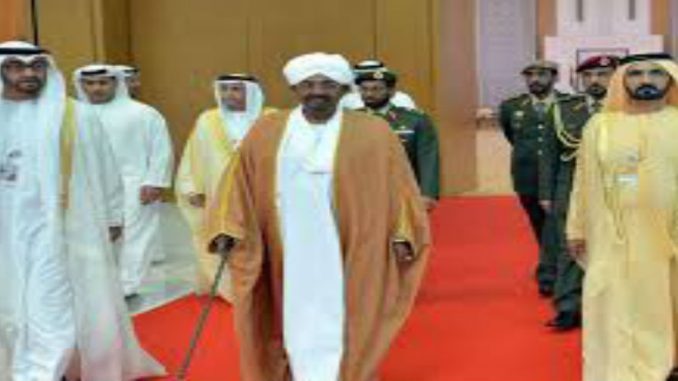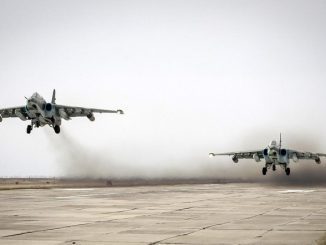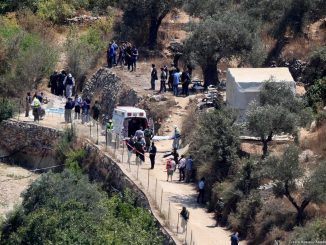
For the second time in less than a month, Sudan’s President Omar al-Bashir criticized Egypt during his latest visit to the United Arab Emirates (UAE), saying that Cairo provided “arms and ammunition to the troops of South Sudan’s President Salva Kiir.”
Earlier this month, Sudan’s President accused the Egyptian intelligence Service of supporting Sudan’s opposition forces. Al-Bashir also said, “The problem is not with al-Sisi but with the regime as there are Sudanese opposition figures that the Egyptian intelligence supports,” indicating that in every bilateral meeting Khartoum is pushing for Cairo to stop supporting the opposition.
Al-Bashir’s comments came in an extensive interview with the Saudi-owned Al-Arabiya TV network during his visit to Saudi Arabia in the beginning of this month.
Did Gulf states use al-Bashir as a pressure card on Egypt’s Al-Sisi?
According to many observers, al-Bashir’s harsh criticism against Egypt’s al-Sisi can’t be interpreted away from some Gulf states which aren’t satisfied with al-Sisi’s role after they poured billions of dollars in support for his regime.
Recently, al-Sisi has stated, during his visit to the Police Academy, that Egypt’s stance towards the regional issues won’t change and Egypt won’t withdraw from its stance under any circumstances.
Al-Bashir’s latest accusation to the Egyptian regime from UAE infers that the Gulf states, including UAE, have given the Sudanese president a green light to criticize Abdel Fattah all-Sisi, which indicates that the coming days will unveil new developments in the Egyptian Gulf relations.
According to many observers, it seems also that the UAE isn’t satisfied with al-Sisi’s support to South Sudan which will benefit the Western interest and threaten Sudan and the UAE investments and agricultural projects there.
In this context, some prominent figures close to Crown Prince of Abu Dhabi and Deputy Supreme Commander of the UAE Armed Forces Mohamed bin Zayed, as his political counselor, said that al-Sisi has become a burden to all countries in the region. The Emirati academic Abd al-Khaleq Abdullah said that al-Sisi turned to a big burden to all countries in the region.
In fact, these comments, which were released for the first time from UAE, indicate that Gulf countries are re-evaluating their former support to al-Sisi’s military regime in Egypt because of al-Sisi’s stance that goes in the favor of Iran – their traditional rival in the region.
In addition to the UAE, all the Gulf states, particularly Saudi Arabia, have also withdrawn from supporting al-Sisi regime amid growing tension between Cairo and Riyadh last year.
The Kingdom has supported al-Sisi in his military coup against Egypt’s first democratically elected president Mohamed Morsi in June 2013. After the military coup, Saudi Arabia poured billions of dollars to al-Sisi regime and promised several investment projects to stabilize his wrecked economy.
In return, Saudi Arabia thought that al-Sisi will support the kingdom in some regional issues of national security.
However, Saudi Arabia has faced several setbacks from al-Sisi.
Regarding the Syrian file, Egypt’s al-Sisi is against the idea of toppling Al-Assad’s regime, which has been a central pillar of Saudi foreign policy in recent years, and over the course of 2016 Egypt became more noticeable in its opposition to regime change in Damascus.
last November, al-Sisi bluntly expressed his support for the victory of Assad’s army in the conflict. In addition, Egypt’s relations with Russia, one of the major backer to Al-Assad’s regime, have been warm, and their fundamental agreement over Syria has been a core component.
Last October, Cairo voted for the Russian resolution in the UN Security Council. As a result, Cairo’s support for the Russian version caused significant anger in the Gulf, especially Saudi Arabia, and was apparently the main for Riyadh cutting off the delivery of oil supplies to Egypt despite the existence of a multiyear agreement for such discounted sales.
Moreover, al-Sisi did not only stall Saudi efforts in Syria, he also ditched Saudi moves in Yemen. Egypt had promised to back Saudi Arabia with ground troops in Yemen if needed, but ultimately balked when the actual military operation started.
In addition, Riyadh was reportedly additionally annoyed and suspicious by the visit of a delegation of Houthi representatives to Cairo in 2015.
Furthermore, the issue of Tiran and Sanafir islands has been the most contentious issues and the one of the recent setbacks in the Egyptian-Saudi relations. The Egyptian government has failed to pass the maritime demarcation agreement that gave away Tiran and Sanafir islands to Saudi Arabia after Egypt’s High Administrative Court rejected an appeal by the government against a lower court’s decision to stop it handing over Tiran and Sanafir on January 16, 2017.
Accordingly, Saudi Arabia has carried out intense activities in Africa to put pressure on the Egyptian regime.
Last December, Ahmed al-Khatib, a senior adviser of Saudi King Salman, paid a visit to the Ethiopian Renaissance Dam within the framework of his presence in the Ethiopian capital, Addis Ababa, to find out the possibility of renewable energy generation.
The Ethiopian source, that accompanied the Saudi official to the dam, said that Al-Khatib visited the dam, and was received by the project manager Semegnew Bekele.
In the same context, Saudi Minister of Agriculture Abdulrahman bin Abdulmohsen al-Fadhli has also visited Ethiopia before Al-Khatib’s visit.
There is no doubt that Egypt is alarmed by the recent Saudi relations with Ethiopia. Cairo is sensitive regarding the Renaissance Dam as it fears that the dam would have negative repercussions on its water shares from Nile River.
In addition to Saudi Arabia, Qatar FM visited Ethiopia which also seemed suspicious to Cairo especially that Egyptian-Qatari relations have soared since the military coup as the Egyptian authorities accused Doha of harboring members of the Muslim Brotherhood.
In this context to many observes, Sudan would also be another card in the Gulf’s list to put pressure on Egypt’s al-Sisi to align with the Gulf states’ interests in the region.
Sudan’s economic problems might be behind Al-Bashir’s alliance with Gulf States
In fact, Sudan is passing by severe economic problems that would easily pave the road for al-Bashir to ally with the Gulf countries for providing financial and economic support for his country.
In the same context, some speculators believe that Sudan will replace Egypt as a supporter of Saudi Arabia and its policies in the region, especially after Sudan’s participation in the Saudi-led military operation in Yemen, which started in March 2015, led to a remarkable improvement in the relationship between Riyadh and Khartoum, whose first batch of soldiers arrived in Aden, a Yemen port city, in October 2015.
As a result, an agreement was authorized last year for Saudi Arabia to invest in a massive, long-term project to cultivate 1 million agricultural acres in northern and eastern Sudan as part of the Saudis’ 30 food-security projects.
Last July, the Sudanese Parliament approved a law that allows Saudis to cultivate and reconstruct millions of acres in northern and eastern Sudan.
Saudi Arabia will pour about $10 billion in the first phase for infrastructures that will take around 10 years. Then, the Kingdom will start to reclaim and irrigate agricultural land from Atbara and Setit Dams.
In addition, under the agreement signed by the Saudi Ministry of Agriculture in Khartoum last July, as part of its “Vision 2030”, Saudi Arabia will be granted the right to exploit water freely to irrigate million acres based on the crop combination recommended by the project studies and a long period of time that will last for 99 years for the optimal exploitation of these vast areas.
Accordingly, the Kingdom will link its food security with Sudan especially that the latter has about 200 million acres suitable for agriculture but it takes advantage of only 30 million of them.
Last month, a Saudi delegation from the Kingdom’s ministry of agriculture and Saudi companies visited Sudan to participate in the inauguration of Atbara and Setit Dams.
The mega electricity project of Upper Atbara and Setit Dams complex, east Sudan, which is considered the largest project in the country to generate hydroelectric power with 320 megawatts, expected to increase to 2000 megawatts by the end of 2017.
In this context, Sudan’s Minister of Water Resources and Irrigation Moataz Mousa has announced that his country will sign several contracts and agreements with Saudi Arabia in the coming period, as an essential step to launch the Saudi project of cultivating and reclaiming millions of acres granted by Sudan to Riyadh in the light of cooperation between the two countries.
On the other hand, many Saudi companies have submitted several requests to the Sudanese government to implement various projects in all types of investments.
The most recent was a joint Saudi-Chinese company which began the agricultural investment’s procedures at Sanar wilayat (state), east Sudan, in area of 90,000 acres which lies in Suki agricultural project.
Moreover, a business delegation from Soliman al-Garhy (Saudi) Group, the owner of Atbara Cement Company, negotiated with government of Kassala state the establishment of a cement company at Maman area a Telkuk locality.
In addition, Al-Qahtani Investment Saudi Company signed an agreement with Sudanese Ministry of Oil and Gas in the beginning of this month, to enter new projects to exploit and develop natural gas associated with oil that is produced by the Saudi group in western Darfur region.
As a result, the economic benefits and investments that al-Bashir will gain from Saudi Arabia will probably align Sudan’s foreign policy under the Kingdom’s service.
In the same context, the Sudanese Emirati relations are also witnessing a new horizon.
In the latest visit to Sudan’s President to the United Arab Emirates (UAE) this month, both countries focused on bilateral ties as well as regional and international issues of common concern.
In return, UAE said it would enhance cooperation with Sudan on the political, economic, development and cultural fields.
Al-Bashir was received at the airport by the Crown Prince of Abu Dhabi and Deputy Supreme Commander of the Armed Forces Mohamed bin Zayed Al Nahyan and several members of the diplomatic community.
The Sudanese president also attended the inauguration ceremony of the International Defense Exhibition and Conference (IDEX 2017) in Abu Dhabi.
Sudan managed to achieve a breakthrough in ties with UAE after a long period of strained relations over Khartoum’s close ties with Tehran.
In 2014, Sudanese authorities ordered the closure of Iranian cultural center in the capital Khartoum, and other states in a move which was seen as a gesture to the Arab Gulf states.
Accordingly, this also suggests the same interpretation that Sudan is shifting towards the Gulf states to maximize its economic benefits to the maximum.
The estimated size of UAE investments in Sudan is $11 billion approximately, of which about $5 billion are projects in progress while the rest are still in pre-execution phase.
In May 2015, Sudan said it offered UAE’s companies $59 billion investment opportunities mainly in agricultural projects.
After his visit to UAE, al-Bashir said that he was assured of the UAE readiness to work and boost development projects in the Sudan.
He also said a clear directive was issued to the various ministers in the UAE to work with the Sudan in the production and agriculture domains and the animal wealth in particular as well as the basic infrastructure projects, namely railway and railway line rehabilitation projects.
Sudan’s National Security and Halai’b and Shalateen
In addition to Sudan’s economic benefits, Sudan has also two important issues, of both national security and historical background, in its alliance with some Gulf states against Egypt.
First, some media reports about a tripartite alliance between Cairo, Juba, and Uganda to siege Ethiopia and Sudan, which has circulated during South Sudan’s visit to Egypt in January 2017, has threatened al-Khartoum’s national security.
During Silva Kiir’s visit to Cairo, an Egyptian newspaper al-Dostour published an article titled: “In Cooperation between Cairo, Juba, and Uganda… Egypt leads a tripartite alliance to siege Ethiopia.”
The Egyptian newspaper mentioned that Egypt seeks to enhance its movements in Africa and especially with the Nile basin countries.
It also reported that Egypt, Juba, and Uganda currently form a tripartite alliance its main target to siege Ethiopia, support Egypt’s interests in the region and put pressure on Addis Ababa’s government if necessary.
Moreover, one of Egypt’s top priority to enhance its influence in Sudan to put pressure on Omar Hassan al-Bashir’s regime if the situation escalated especially that al-Bashir’s policy toward Egypt is changeable and unstable.
In addition, al-Bashir backs Ethiopia against Egypt, according to al-Dostour newspaper.
In the same context, Sudan Tribune (an electronic news portal on Sudan and South Sudan) said, “The three leaders agreed to open training camps for Sudanese armed opposition at Uganda-South Sudan border with the view to toppling the Sudanese government for supporting the construction of a dam by Ethiopian government on River Nile.”
“This deal, according to security sources, resulted in dispatching more than big trucks full of Ugandan troops heading to South Sudan,” according to Sudan Tribune.
It added that unconfirmed reports claimed that 20 trucks entered Nimule through Elgu, and eighteen trucks via Ajdumani to Kajokej.”
A source told Sudan Tribune that the mission is to chase the armed opposition figures and to clear out rebellion around South Sudan border with Uganda and the Democratic Republic of Congo, though the Uganda government blackmail the people in the region that they are pursuing Uganda Armed oppositions in Northern Uganda, Eastern Uganda and West Nile as a mere political propaganda.
Sudan Tribune also pointed out to the of al- Sisi’s visit to Uganda last month followed by unofficial visit of president Museveni to Juba three days after Egypt President visited Uganda,” in which President Museveni during a closed-door meeting with President Silva Kiir, conveyed the message that he and Egyptian leader to open up a training camp at border with his country.”
According to the Sudanese news site, both Kampala and Juba meetings concluded to provide support to the Sudanese and Ethiopian Armed oppositions which will involve training and providing weapons to SPLM-North, Darfur Rebels both with Military Equipment and full logistics including Finance. “Egypt will supply Uganda then South Sudan will be the corridors to supply the equipment to the SPLM-North, Darfur Rebels, and Ethiopian Armed opposition.”
According to media reports, these military training camps will be opened along South Sudan border with Uganda and Congo border. The main aim behind that “to use Congo Central Africa corridors to launch attacks on Sudanese government than using South Sudan Border. The training Camps will be around Mofok and around Lasu,” said Sudan Tribune.
A security source, who preferred to remain anonymous, said that this will be making it o easier for transportation of the Equipment by land because by air it will be difficult because South Sudan air-space is under the control of Sudan.
The source further alleged that the Egyptian government had sent 58 senior military commanders to South Sudan through Uganda to access the ground for training for SPLA, Sudanese and Ethiopian rebels.
He also added that the commanders are from different military units, armor, artillery, air-defense and central military intelligence.
Last August, Sudan Tribune cited military sources saying that South Sudanese recruits largely drawn by the ethnic group of President Salva Kiir and his army chief of general staff, Paul Malong Awan, have been trained by foreign instructors from Egypt and neighboring Uganda to perform airborne landing to seize an enemy’s airfield and retain it until the arrival of the main forces.
Second, the issue of Halai’b triangle, a historical conflict in Egyptian Sudanese relations, have risen once more to the surface, as Sudan took advantage of the tensions between Egypt and some Gulf states to renew its demands to restore it.
It is noteworthy that Sudan has called more than once in an official way to restore back its right over Halai’b and Shalateen.
During his T.V interview with the Saudi Channel, President Omar al-Bashir mentioned that Sudan will resort to the United Nations Security Council if Egypt refuses to negotiate over the Halai’b triangle.
He said, “The Halai’b triangle is Sudanese,” adding that Halai’b was one of the Sudanese districts that took part in the first elections held under the joint Egyptian-British governance.” He added, “Elections are a major sovereign practice.”
Last month, Sudan renewed its complaint against Egypt in the UN Security Council to reconsider the borders between both countries, referring to Halai’b and Shalateen area, according to a Sudanese diplomatic source.
In fact, al-Khartoum has called Cairo for direct negotiations regarding Halai’b and Shalateen case similar to what has been implemented with Saudi Arabia regarding Tiran and Sanafir islands that the Egyptian government has announced that they belong to Saudi Arabia last April during King Salman’s visit to Egypt.
In addition, the diplomatic source, who preferred to remain anonymous, added, “The permanent mission of Sudan at the United Nations has been contacted on January 5,2017 to keep Sudan’s complaint at the Security Council under consideration which was submitted on 20-2-1958 over the Egyptian borders.”
The Hala’ib triangle, which is a 20,580-km area on the Red Sea, has been a disputable issue between Egypt and Sudan since 1958, shortly after Sudan gained its independence from the British-Egyptian rule in January 1956.
Since the mid-1990’s, the area has been under Cairo’s full military control.
Last April, Cairo refused a demand by the Sudanese government to hold direct negotiations on Hala’ib and Shalateen or to accept the referral of the dispute to the International Court of Arbitration.
Egypt has used to reject Sudan’s repeated calls for referring the dispute to international arbitration.
The international law stipulates that the agreement of the two parties is needed to arbitrate a dispute by the tribunal.
Moreover, the Egyptian authorities have imposed restrictions on the entry of Sudanese nationals into the area.
In the end, it seems that al-Bashir is closer than ever to Gulf countries as long as he abides with the Gulf’s regional agenda and national security interests. Unlike al-Sisi who stands on the other side with Gulf rivals in the region, leaning towards the Russian, Iranian and Syrian axis.
Jabber al-Harami, a Qatari journalist and former editor-in-chief of Al-Sharq newspaper in Qatar, said that Sudan’s leaning toward the Saudi axis in the region — given that it closed the Iranian Embassy in Khartoum — is consistent with the Arab position, which is exemplified by the Gulf Cooperation Council countries led by Saudi Arabia.
He said, “The Gulf states are defending the Arab causes as opposed to the interests of Iran and the Syrian regime before the international community, while the Egyptian position is drifting away from that toward Iran and Syrian President Bashar al-Assad.”
Harami said the Gulf-Sudanese relationship will grow because of Sudan’s influence and its strategic value on the Red Sea and as a gateway to the African continent.
He continued,” If Egypt continues leaning toward rapprochement with Syria, Russia and Iran, Sudan will surely assume the role of Saudi Arabia’s ally in Africa.”



